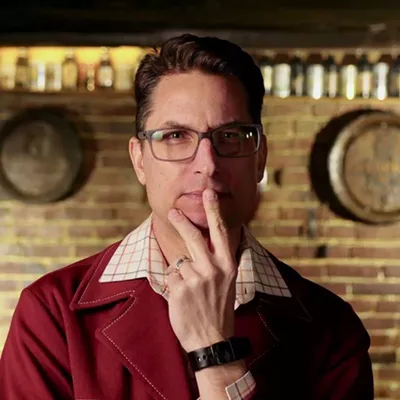Tuesday, January 17, 2012
TUSD Banning Books? Well Yes, and No, and Yes
Are books being banned from Tucson Unified School District classrooms as part of the district's work to dismantle Mexican-American studies after the governing board voted Tuesday, Jan. 10 to end the classes?
Well, it depends on your definition of "ban" ... maybe yes, and maybe no.
School textbooks are being taken out of MAS classrooms—the seven books on a list referred to in administrative Judge Lewis Kowal's recent decision. Teachers are also being told by administrators that they need to be careful about other books they teach from and the curriculum they use, and that perhaps the best way to handle this is to refer to the administrative judge's decision and state Superintendent John Huppenthal's ruling, which cite a variety of other contemporary novels and writings that are considered suspect.
The school district says no books are being banned; they're still available in libraries and other areas. But teachers are being told to stay away from books and lessons that have themes on race, ethnicity and oppression.
Right now this mess is ripe for an allegory based on Arthur Miller's The Crucible. Until this anti-Mexican American Studies law is gone, anyone can complain about anything taught in a former-MAS teacher's class and accuse him/her of violating HB 2281.
On Thursday, Jan. 12, The Range talked to Chicano-literature teacher Curtis Acosta. Several things you should know about Acosta: He's a finalist for the UA's Circle K Teacher of the Year award, he was honored with the 2011 University of Arizona Goodman Award, the 2009 Martin Luther King Jr. Classic Dream Award, and chosen as the 2010 Tucson High Magnet School Teacher of the Year.
The result of the Jan. 10 vote, according to Acosta, is a picture of confusion further fueled by administrators unable to answer specific questions.
“We’re filled with the vagueness that the law is founded upon,” Acosta said. “No one knows what to tell us definitively or when we ask specific questions.”
That vagueness has strengthened the inequities from classroom to classroom. Teachers not under the MAS banner and in other schools throughout the district can teach and are teaching from books that Huppenthal found objectionable or questioned — but not Acosta and his MAS co-workers.
Acosta said teachers have been told that they can no longer teach Chicano literature or history, or keep specific books in their classrooms, such as 500 Years of Chicano History: In Pictures, edited by Elizabeth Martinez, and the acclaimed textbook Rethinking Columbus: The Next 500 Years.
On Thursday, Jan. 12, MAS teachers were sent a memo from the district saying that the following books, because they are specifically mentioned in the court order, are to be removed from the classroom and then boxed up and stored in the district's textbook depository:
Critical Race Theory by Richard Delgado
500 Years of Chicano History in Pictures edited by Elizabeth Martinez
Message to Aztlan by Rodolfo Corky Gonzales
Chicano! The History of the Mexican Civil Rights Movement by Arturo Rosales
Pedagogy of the Oppressed by Paulo Fiere
Rethinking Columbus: The Next 500 Years edited by Bill Bigelow and Bob Peterson
Occupied America: A History of Chicanos by Rodolfo Acuña
From Acosta's perspective the reach into the classroom goes beyond these specific books. He and other teachers were told they would have to change gears halfway through the year, so a Chicano-literature class becomes an English-literature class. That means the curriculum has to change, too, and, with it, so do books that may not be on this specific list—books like Luis Alberto Urrea’s novel Devil’s Highway, Rudolfo A. Anaya's Bless Me, Ultima and Mexican White Boy by Matt de la Peña.
Acosta was a literature teacher at University High School before he left specifically to teach Chicano literature at Tucson High Magnet School. At UHS, he taught William Shakespeare’s The Tempest from a historical context, which includes looking at issues such as slavery, race and the big bad word that gets people like John Huppenthal and state Attorney General Tom Horne all grumpy — oppression.
In a discussion with Acosta's department head and principal, he said it was determined that it might be best to stay away from The Tempest and other books that have these themes. Acosta figured if this classic play is off-limits for those reasons, then works like Huckleberry Finn are probably off-limits, too.
All of this is taking place because of lack of communication, a lack of planning, and confusion over how to stick to Kowal and Huppenthal's ruling—a ruling that's vague and based on a poorly written and hateful law.
Acosta said he’s scrambling to put together a curriculum that will have to be approved by his supervisors. Beyond what he teaches, he wonders about his students who’ve been in his classes the past six months. What if they bring up the topics Acosta is not allowed to teach? That is still being discussed.
Acosta said he worries that he and other teachers will be written up, possibly warned once, and then fired in violation of the law. That could happen if anyone disagrees with what they are currently teaching—as long as the law remains in place. “That’s why this is so high stress,” Acosta said. “I really hope that by next Friday, I can teach with some confidence.”
Acosta said he knows that the books identified in the court order will be boxed up and put in the district’s textbook depository. He hasn’t heard directly what he should do with the walls in his classroom, which may be considered in violation of the law, too. “We don’t know yet what we should remove.”
During discussions with his principal Abel Morado, who is about to start a new position in TUSD as supervisor of high schools, Morado looked just as uncomfortable trying to answer the teachers’ questions. “We’re all ignorant on how we’re supposed to move forward. No one has answers,” Acosta said.
Yolanda Sotelo, a Pubelo High School Chicano literature teacher about to celebrate her 30th year teaching our children, confirmed the confusion Acosta described. From her perspective, as someone who makes it a priority that her students are prepared to go to college, this process is not good for students in the now dismantled Mexican-American studies classes.
Some of the kids watched as the books were being boxed and taken out of their classroom. Many of the kids are asking if they can finish projects they were in the middle of working on, because they deal with the themes that school administrators are worried could violate the law.
Sotelo said the worst part for her is having to let go of a very unique curriculum she has worked hard to develop and keep fresh—including the latest contemporary novels written by Chicano and Chicana authors for her senior level class, and meeting with her colleague Chicano history teacher Sally Rusk to refresh a curriculum for her junior level literature class that brings in historical perspectives.
For her junior level class she's putting together a lesson on Patrick Henry's speech to the First Continental Congress, Martin Luther King Jr., and Malcom X. According to the administrative court's ruling, its perfectly acceptable to teach on oppression, as along as it's not in an emotionally charged manner. What that means no one knows, but Sotelo figures these lessons might be safer then what she had before. “I can’t just teach just anything,” Sotelo said. "I spent a year preparing for my classes reading novels the kids are really enjoying.”
Before the TUSD board vote, the class had just started Mexican White Boy by Matt de la Peña, about a young many who is half white and half Mexican-American and how he comes to terms with both cultures and families. Her department head, who is supportive, said the kids could continue reading these books during silent reading time in which students are given a choice of what to read.
In the junior level class they were studying Mexican Revolution-era literature and reading Like Water for Chocolate. Those students have decided to keep reading that book during silent reading. One irony in this process is that an American literature book she was provided to use in her classes has two pieces she’s taught in her Chicano literature classes including Yo Soy Joaquin, a poem that captures heart and soul of the Chicano movement by Rodolfo Corky Gonzales. “It’s OK to teach it if it’s in this book, but not in (a Chicano literature) class,” she said, obviously frustrated.
Her students, she said, are very confused and upset. “… we were told that we were going have administrators make sure we are not teaching what we were told not to teach, that we’d be reprimanded, and coming in and looking at our posters. … I feel insulted.”
Word has spread across the country, not only about the school board's vote to end Mexican American Studies, but the horrible aftermath of taking books out of classrooms based on a ruling that is scared of our contemporary geniuses like Urrea and Gonzalez. As a result of the national attention, the district finally issued a statement today that reports of a district book ban are "completely false and misleading."
From the press release:
Seven books that were used as supporting materials for curriculum in Mexican American Studies classes have been moved to the district storage facility because the classes have been suspended as per the ruling by Arizona Superintendent for Public Instruction John Huppenthal. Superintendent Huppenthal upheld an Office of Administration Hearings’ ruling that the classes were in violation of state law ARS 15-112.
...
Other books have also been falsely reported as being banned by TUSD. It has been incorrectly reported that William Shakespeare’s “The Tempest” is not allowed for instruction. Teachers may continue to use materials in their classrooms as appropriate for the course curriculum. “The Tempest” and other books approved for curriculum are still viable options for instructors.
...
Tucson High Magnet School Principal Dr. Abel Morado acknowledges that the gathering of materials could have been accomplished outside of class time in all instances.
“We had a directive to be in compliance with the law and acted quickly to meet that need,” says Morado. “Part of that directive is communicating with teachers, students and parents, and collecting materials. We regret that in one instance materials were collected during class time.”
TUSD deputy superintendent Maria Menconi told The Range on Friday, Jan. 13 that she’s not surprised by MAS teachers’ frustrations and admitted “It’s going to take awhile. It’s a messy process. ... I get this very, very personal and that it hurts. ... We have an obligation to carry out the (court) order."
It is good the students remained with their teachers. That's one blessing, but the reality is that it will take a long time for the district to recover from what's taken place this past week. But students, teachers and the Mexican American Studies supporters aren't busy sitting in a corner licking wounds — they are only strengthened and are ready for the next leg of this fight.
Tags: John Pedicone , John Huppenthal , Maria Menconi , Curtis Acosta , Abel Morado , Yolanda Sotelo , Mexican American Studies , William Shakespeare , Luis Alberto Urrea , Corky Gonzales , Richard Delgado , Elizabeth Martinez , Rodolfo Corky Gonzales , Arturo Rosales , Paulo Fiere , Bill Bigelow and Bob Peterson , Rodolfo Acuña , Tucson High Magnet School , ethnic studies , Mexican American Studies , Pueblo High School , Lewis Kowal














